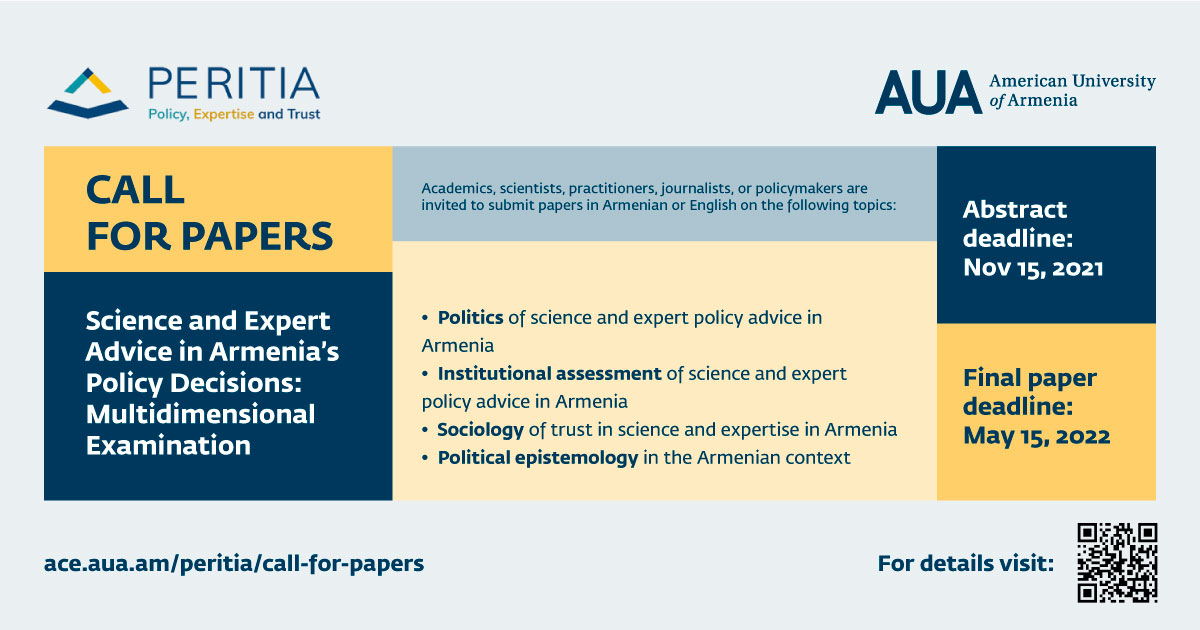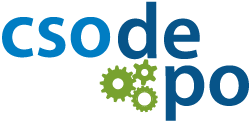Call for Papers by the American University of Armenia

Papers should be on epistemological, political, institutional, or social aspects of inclusion of science and expert advice in governance. The papers can be written by one or a group of academics, experts, scientists, practitioners, journalists, or policymakers. The papers can be submitted in Armenian or English. The broad topic areas and the questions of interest are as follows:
- Politics of expert/science policy advice in Armenia
SUGGESTED TOPICS: When do politicians in Armenia listen to expert advice? What do they do with the expert advice? What do they expect from scientists/experts? Why are some scientists integrated as advisors while others not? How do politicians and policymakers publicly use their relationship with scientists or experts? What is the role of social media in the political calculus of adopting expert/science advice?
- Institutional assessment of expert/science policy advice
SUGGESTED TOPICS: What policy advice mechanisms exist in Armenia at the national, regional, and local levels? Are there specific types of scientific and expert advice mechanisms for policy decision making? What are the successes and shortcomings of the existing mechanisms? How do they compare to other countries or regions?
- Sociology of expert/science policy advice in Armenia
SUGGESTED TOPICS: How can we characterize Armenian society’s trust toward science, expertise, and evidence-based decision making? How is this trust built and eroded? What is the role of the educational system in the country in creating a culture of “trust and vigilance”? What are mechanisms and antidotes of conspiracy theories? How much do misinformation and social media impact on science and expert policy advice? Is there anything unique about the post-Soviet reality of a country like Armenia that impacts the dynamics of trust in expert/science policy advice?
- Political epistemology: contemplation on how facts and expert advice influence Armenia’s political decision making
SUGGESTED TOPICS: The value of expert/policy advice in a democratic society? How are experts and scientists recognized in Armenia? What are the epistemic expectations from experts? What are the epistemic expectations from scientists? What are standards and expectations that can help “weed out” fake news and misinformation campaigns? How can we avoid epistemic “bubbles”? All of these should be examined with the context of Armenia and when needed comparatively.
Award
Authors of the papers accepted for publication will be awarded an honorarium to be specified. Up to 20 papers will be accepted for publication.
Deadlines
- Submit an abstract (max 1 page) by November 15, 2021
- Approval of abstract by Nov. 30, 2021 (1)
- Submit full article (max 20 pages excluding bibliography) by May 15, 2022
- Publication date October 15, 2022
Review Board
National and international PERITRIA experts.
(1) Approval of abstracts means that you will be invited to participate in monthly workshops starting in November 2021 and running through May 2022. These workshops will be held as a co-design process that will allow us to create a community in which the individual papers can coalesce around certain themes and goals that emerge from the ideas and research of the participants and stakeholders.
